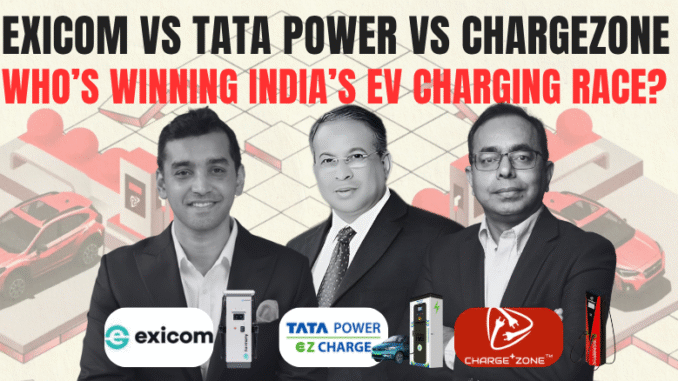
As of late 2025, India’s electric vehicle (EV) charging sector is at a crossroads. The initial era of subsidy-fueled, rapid expansion has given way to a more mature market where technological superiority and business model viability are the new metrics for success. A competitive analysis of the landscape reveals three distinct leaders, each with a unique strategy: Exicom Tele-Systems, the hardware technology leader; Tata Power, the incumbent network giant; and ChargeZone, the agile service innovator.
The Indian EV charging market, valued at USD 443.3 million in 2024, is forecast to reach USD 1.9 billion by 2030, growing at a 27.8% CAGR. This growth is overwhelmingly driven by DC fast chargers, which comprised nearly 84% of market revenue in 2024. However, this explosive growth is tempered by significant challenges. Public charging infrastructure suffers from chronically low utilization rates—often below 5%—and inconsistent quality. Adding to the uncertainty are proposed regulatory changes, such as restrictions on EV charging in building basements due to fire safety concerns, which threaten urban adoption.
Competitive Deep Dive
Exicom Tele-Systems: The Technology Architect
Exicom has firmly established itself as the sector’s technology leader through a focus on vertically integrated manufacturing and high-power charging solutions. Its strategic agreement to acquire US-based Tritium in August 2024 was a pivotal move, elevating its technological capabilities to a global standard. Exicom operates on a B2B model, supplying advanced hardware—including chargers with outputs up to 400kW—to Charge Point Operators (CPOs) and automotive OEMs, effectively engineering the foundational technology for the entire ecosystem.
Tata Power: The Incumbent at a Crossroads
With India’s most extensive network—over 5,500 public and semi-public charging points across more than 550 cities—Tata Power’s EZ Charge brand enjoys unmatched scale and recognition. However, the model that built this scale has proven economically challenging. Faced with network-wide utilization rates below 5%, the company has paused its aggressive public expansion to pivot toward more profitable ventures. Its September 2025 partnership with VE Commercial Vehicles (VECV) to provide charging for electric truck fleets marks a strategic shift toward the predictable, high-volume demand of the commercial sector.
ChargeZone: The Asset-Light Innovator
ChargeZone represents a new breed of CPO, prioritizing business model innovation and capital efficiency. Its asset-light “Dealer Owned, Company Operated” (DOCO) franchise model allows for rapid network expansion with lower capital expenditure. Rather than manufacturing hardware, ChargeZone sources best-in-class technology from partners like Exicom and Kempower, deploying ultra-fast 400kW chargers for heavy vehicles. Its core strength lies in its proprietary ChargeCloud software platform, which optimizes operations and user experience, and a deployment strategy focused on high-utilization highway corridors.
Head-to-Head Analysis
The distinct strategies of these three companies are best understood through a direct comparison of their technological capabilities and market execution.
Hardware and Technology Competencies
| Feature | Exicom Tele-Systems | Tata Power (EZ Charge) | ChargeZone |
| Core Business Model | Vertically Integrated Hardware Manufacturer & Solutions Provider | Utility-Led Charge Point Operator (CPO) | Asset-Light, Software-Focused CPO |
| Hardware Sourcing | In-House Design & Manufacturing | Sourced from Certified Vendors | Sourced from OEM Partners (e.g., Exicom, Kempower) |
| Max DC Power Output | Up to 400kW+ (Harmony Boost, Tritium platforms) | Up to 240kW | Up to 400kW+ (SuperCharging Network) |
| Key Tech Differentiators | BESS Integration, Distributed Architecture, Liquid Cooling | Focus on Network Operations Center, RFID-enabled use | Software Platform (ChargeCloud), AI-based optimization |
Market Execution and Strategy
| Feature | Exicom Tele-Systems | Tata Power (EZ Charge) | ChargeZone |
| Network Size (Public) | Supplier; manages 150,000+ chargers globally | 5,500+ Public/Semi-Public Points (Largest in India) | 2,700+ Charge Points (own network), 13,500+ via roaming |
| Primary Customer Segments | B2B: CPOs, Automotive OEMs, Fleet Operators | B2C: Home & Public Charging; B2B: Commercial Fleets | B2B: Fleets; B2C: Highway Transit Users |
| Geographic Focus | Pan-India & Global Supply | Pan-India Urban & Highway Density (550+ cities) | Strategic Highway Corridors |
| Key Strategic Partnerships | ChargeZone, Multiple OEMs (MG, JBM, Tata Motors) | VE Commercial Vehicles, Tata Motors, HPCL, MG, JLR | Hyundai, Audi, MG Motors, Mercedes Benz, Roaming Partners |
Strategic Outlook
In this dynamic market, leadership is not monolithic. Exicom is the undisputed leader in hardware innovation, Tata Power commands the largest physical network, and ChargeZone excels in creating a scalable and financially sustainable business model. The future of the industry will be defined by the ability to masterfully integrate superior hardware, intelligent software, and a strategy that finally solves the sector’s persistent utilization crisis.


